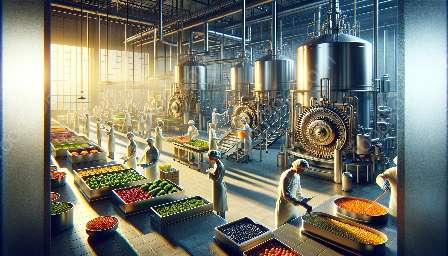In today's rapidly evolving food processing industry, process control and automation play a crucial role in ensuring efficiency, safety, and quality. From industrial-scale manufacturing to culinary innovation, the application of advanced technologies has revolutionized the way food is produced, processed, and consumed. This article delves into the significance of process control and automation in the context of food processing and its intersection with the emerging discipline of culinology.
Understanding Food Process Control and Automation
Food process control and automation refer to the use of digital, mechanical, and electronic technologies to monitor and manage the production, packaging, and distribution of food products. These technologies are designed to streamline operations, reduce human error, and uphold rigorous quality standards throughout the entire production process.
The Evolution of Food Processing Technology
Historically, food processing relied heavily on manual labor and rudimentary machinery. However, the advent of process control and automation has transformed the industry, allowing for greater precision, consistency, and efficiency. From automated assembly lines in large-scale factories to state-of-the-art kitchen equipment in culinary settings, technology has become integral to modern food processing.
Challenges and Opportunities in Food Automation
While food automation offers numerous benefits, it also presents unique challenges. Balancing the need for cost-effective production with stringent regulatory requirements and consumer preferences requires careful navigation. Additionally, there is an ongoing dialogue regarding the potential impact of automation on employment in the food processing industry.
Quality Control and Assurance
Process control and automation enable real-time monitoring and adjustment of production variables, leading to enhanced quality control. By leveraging sensors, data analytics, and machine learning algorithms, manufacturers can identify and rectify deviations from desired parameters, ultimately ensuring the consistency and safety of food products.
Integration of Culinary Art and Food Processing
In recent years, the concept of culinology has emerged as a fusion of culinary arts and food science. Process control and automation play a pivotal role in this interdisciplinary field, where chefs, food scientists, and technologists collaborate to create innovative and standardized food products with a focus on taste, texture, and nutritional value.
Technological Advancements in Culinology
Within the realm of culinology, advanced equipment and intelligent systems have redefined the way chefs and food technologists approach recipe development, food production, and menu planning. By harnessing automation, culinary professionals can achieve greater precision in cooking, baking, and flavor profiling while maintaining the artistry and creativity inherent to the culinary craft.
Enhancing Sustainability and Efficiency
Process control and automation are instrumental in promoting sustainability within the food processing ecosystem. By optimizing resource utilization, minimizing waste, and reducing energy consumption, these technologies contribute to a more environmentally conscious approach to food production. Furthermore, automated systems can streamline supply chain logistics, leading to improved efficiency and reduced environmental impact.
The Future of Food Automation
As technology continues to advance, the future of food automation holds immense promise. Innovations such as robotics, smart packaging, and precision farming are poised to further revolutionize the food processing landscape, paving the way for safer, healthier, and more diverse food options for consumers worldwide.


